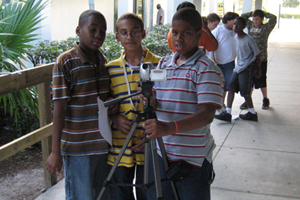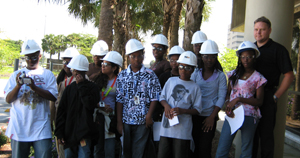 |
 |
 |
|||

|
 |
Crystal Lake Middle |
|||
|
Essential Question:
How can we reduce the ecological footprint of our daily lives
to preserve our natural resources?  Project Desciption:
How can we preserve the environment for future generations? What is an ecological footprint and what does it have to do with preserving the environment? Students in grades 6, 7 and 8 explored these and other questions to help them understand the role that each and everyone one of us plays in preserving our natural environment for future generations.
Teachers/Classes:
Phillip Shaver (Science, Grade 6): Students in Mr. Shaver's 6th grade science classes created movies to explain what an ecological footprint is, and why it should be small; what conservation is and how people can conserve and preserve, and steps individuals can take to reduce their ecological footprint. The movies were shared with the school to develop a campaign of public role-modeling, and to help students understand how and why they should show more respect for the environment. Susan Artz (Mathematics, Grade 7) and Melody White-Wiley (Language Arts, Grade 7): Students in Ms. Artz and Ms. White-Wiley's classes documented the process of recycling waste materials and using them to generate electricity at Broward County's Wheeleabrator, a waste-to-energy plant. On a field trip to the plant, students took pictures, listened to presentations by workers and presented the information learned in a comic strip format. In a separate study for geography, Ms. White-Wiley's students also created travel brochures. Furthermore, students in Ms. Artz's math class compiled data related to their research on reducing ones' ecological footprint and presented the data using charts and graphs in a multimedia presentation.  Melissa Keefe (Science Grade 8): Students in Ms. Keefe's science classes created multimedia presentations to build awareness of ecological footprints. They also investigated how paper is recycled and created their own recycled paper from used paper. Tracy Rice (Science Grade 8): Ms. Rice's students learned how humans impact the environment both negatively and positively. Students became recycling activists, implementing a recycling program at Crystal Lake Middle School. They also learned about green building practices and alternative energy sources. Students created podcasts and movies to document their findings and to educate other students. Brandy Zdenek (Language Arts, Grade 8): Students started by first observing the amount of waste they generated, by not throwing out any trash they generated for an entire week. From there, collaborative groups chose particular areas of conservation that they felt passionate about. After researching the problem, students developed a public awareness campaign using movies and podcasts to persuade others to take action to reduce their ecological footprint with regard to that issue. Dr. Dennis Wechter (Media Specialist and CLMS GLIDES Coordinator): supported GLIDES students with research and research strategies.
|
|||||